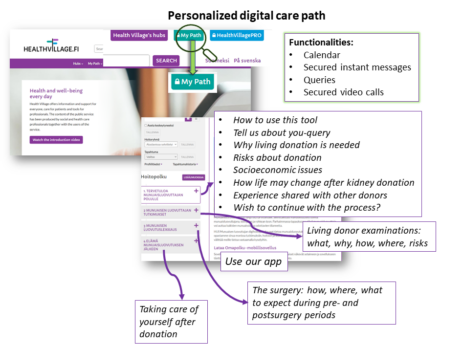We evaluated the Living Donor Digital Care Path (LD-dcp), an interactive health technology tool designed to standardize the informed consent process for living kidney donors. Over three years, the tool demonstrated high usability and engagement, effectively educating donors about the medical, psychological, and procedural aspects of kidney donation. While it supported standardized information delivery, its role in influencing donor decisions was limited, highlighting the need for supplemental educational approaches.
What was the context of our study?
Living kidney donation is the preferred option for patients awaiting transplants, but the process carries risks that require informed decision-making. Despite guidelines, the informed consent process varies widely across healthcare systems. To address these gaps, Helsinki University Hospital developed the LD-dcp as part of the Kidney Hub, aiming to provide comprehensive and standardized information to potential donors.
What did we do?
We conducted a cross-sectional study involving 127 living kidney donor candidates who used the LD-dcp between 2019 and 2021. Participants completed surveys assessing their eHealth literacy, the usability of the tool (System Usability Scale), and the utility of its content. Qualitative feedback was also collected through open-ended questions.
What did we find?
Participants found the LD-dcp highly usable (mean SUS score: 4.4) and informative. Women were more likely than men to search for kidney donation information online before using the platform. The LD-dcp facilitated over 3500 messages between users and healthcare providers, demonstrating its effectiveness as a communication tool. However, donors indicated that while the tool provided clarity on procedural details, it had minimal impact on their decision-making. Concerns highlighted included postsurgery coping and managing recipient expectations.
Why is this important?
The LD-dcp represents a significant step forward in standardizing the informed consent process for kidney donors. By providing accessible, high-quality information, it supports donors in understanding the risks and responsibilities of donation. However, the findings suggest that digital tools should complement, rather than replace, traditional educational and counseling methods to address emotional and ethical complexities.
Reference
Ortiz F, Grasberger J, Ekstrand A, Helanterä I, Giunti G. Interactive Health Technology Tool for Kidney Living Donor Assessment to Standardize the Informed Consent Process: Usability and Qualitative Content Analysis. JMIR Formative Research. 2024;8:e47785. https://doi.org/10.2196/47785.

